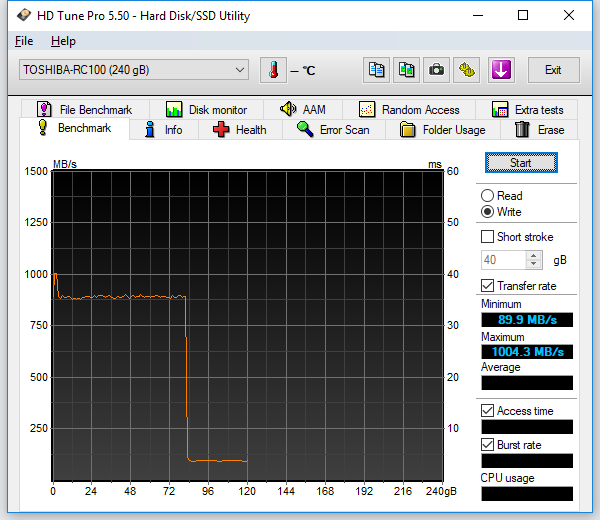HDTUNE
HD Tune is a Hard Disk Utility with many functions from error checking, health testing (S.M.A.R.T.), and of course benchmarking. To build upon our real world write test we also looked to see where the write speeds leveled off to by using HD Tune Pro. If SLC caching is being utilized, this test will typically show it.
240GB
480GB
Finally, taking a look at how it performs under HDTune’s full write test, we can see that the RC100 utilizes an SLC cache and that once the SLC cache fills, the write performance will degrade. The 240GB model’s results show that it consistently averages about 840MB/s for about 80GB, then it falls off to about 90MB/s. The 480GB model’s results, however, are very inconsistent during this test up to a little over 200GB. Performance fluctuated from 950MB/s down to just above 400MB/s during that span but leveled out to 120MB/s when it ran out. Why is this? We think it is still trying to recoup from our PCMark 8 testing. After almost a whole day of hardcore reading and writing over 2TB of data, the RC100 still has some cleanup to do. So much so that even after a secure erase, this was the result.
REPORT ANALYSIS AND FINAL THOUGHTS
The release of the Toshiba OCZ RC100 marks the introduction to a new technology that just might take flight in the upcoming months. With DRAM manufacturers under scrutiny for their price hikes with no end yet in sight and consumers demanding lower cost storage devices that outperform HDDs, HMB may be the next popular thing. So far, in the RC100’s case, it has enabled some incredible performance from a device that is smaller than my thumb. With a PCIe 3.0 x2 interface, the RC100 reaches 1.6GB/s read and 1.1GB/s write just as promised. In AS SSD it blasted through its rated 4K random spec of 150K/110K IOPS read/write, reaching over 233K/147K IOPS read/write instead. As well, it was able to deliver very respectable results of over 400MB/s in PCMark 8’s standard run, ranking it above any SATA SSD we have tested and absolutely smashing any HDD’s performance.
In PCMark 8 Extended, unlike the standard run, we pushed the RC100 to its limits. So much that it had some latency spikes that surpassed our reference HDD result in the degrade and steady state phases. Once it got through these phases, however, it was smooth sailing from there on out. In the recovery phase (more comparable to real-world use), it delivered decent performance that even surpassed some of the competition.
Following that, our power consumption testing showed that Toshiba isn’t messing around when it comes to efficiency. Although we could have told you that based on our reviews of their OCZ RD400 and other enterprise gear, the RC100 embodies this again. Idle power consumption wasn’t the best we’ve seen, but it also wasn’t anywhere near the worst. What really stood out is its staggering efficiency score of nearly 500MB/s per W in our write test. It outranks every SSD we have tested on that chart to date by a large margin. As well, during that test each drive averaged over 900MB/s write speeds for two transfers, so the SLC cache filling up shouldn’t be an issue for most. But, for those interested, we also ran HDTune’s write test to see where it dies off. After about 80GB the 240GB model’s write speeds dipped to 90MB/s and after about 200GB, the 480GB model dipped to 120MB/s.
FINAL THOUGHTS
From the get-go, Toshiba is pricing the OCZ RC100 very competitively with MSRPs that are right on the edge of SATA prices, $0.32-0.33 per GB. It delivers a respectable amount of TBW per capacity as well as a 3-year warranty. After putting the RC100 through its paces and seeing performance figures that easily surpass SATA we can definitely recommend it.
Being so small is perfect for small form factor systems and notebooks. Because of its tiny M.2 form factor, it can slide into any motherboard with a supporting M+B key socket routed for PCIe connectivity. This reduces the need for additional cable clutter which allows for a cleanlier system if you are building a new PC or overhauling your rig.
If you are in search of a new NVMe SSD, the RC100 just might be the mainstream option for you. With reading speeds of 1.6GB/s and writing speeds of 1.1GB/s, it offers plenty of bang for your buck. The utilization of the new HMB technology has also earned the Toshiba RC100 our Innovation Award. Who knows, more SSDs like this could be just around the corner. Watch out SATA, time’s a ticking!
 The SSD Review The Worlds Dedicated SSD Education and Review Resource |
The SSD Review The Worlds Dedicated SSD Education and Review Resource | 

